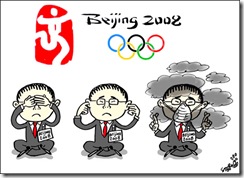China's Olympic Promises

The following are some of the promises given by Chinese and Olympic officials leading up to and following Beijing's being awarded the 2008 Summer Olympics in 2001.
-
Beijing's loss of the 2000 Olympics to Sydney was widely attributed to its poor human rights record. After sitting out the bidding for the 2004 Olympics, China made as the centrepiece of its bid for the 2008 Olympics, a promise of improved human rights record. China reminded the world that Article 35 of the Chinese Constitution guarantees: "Citizens of the People's Republic of China enjoy freedom of speech, of the press, of assembly, of association, of procession, and of demonstration."
-
And just before launching in 1998 its bid for the 2008 Games, China voluntarily signed the International Covenant on Civil and Political Rights, Article 19 of which declares: "Everyone shall have the right to hold opinions without interference. Everyone shall have the right to freedom of expression; this right shall include freedom to seek, receive, and impart information and ideas of all kinds, regardless of frontiers, either orally, in writing or in print, in the form of art, or through any other media of his choice."
-
In a December 12 , 2000 letter to Mr. Juan Antonio Samaranch, President,International Olympic Committee, Liu Qi, mayor of Beijing at the time wrote: "I hereby solemnly pledge that, if Beijing has the honour of being awarded the Host City for the 2008 Olympic Games, we will provide the Olympic Family with world-class transport, high-tech services and a clean and beautiful environment."
-
While bidding in April of 2001 for the International Olympic Committee contract to host the 2008 Olympics, Liu Jingmin, the Executive Vice President of the Beijing 2008 Olympic Games Bid Committee, told the world: "By allowing Beijing to host the Games you will help the development of human rights. China and the outside world need to integrate. China's opening up is irreversible. The Olympic Games is a good opportunity to promote understanding."
- Just before Beijing won its bid for the Games, senior Chinese officials promised that any protesters, including Tibetans, would be free to voice their opinions. Said Wang Wei, secretary-general of the Beijing bid committee, at a press conference in 2001: "You can apply to demonstrate and the police will give you a time and place."
- Upon being awarded the contract in July of 2001, Wang Wei, the Secretary General of the Beijing Olympics Organizing Committee confirmed: "We are confident that the Games' coming to China not only promotes our economy but also enhances all social conditions, including education, health, and human rights."
- Jacques Rogge, president of the International Olympic Committee, said in April 2002: "We are convinced that the Olympic Games will improve the human rights record in China."
- As recently as September 27, 2006, Liu Qi, the President of the Beijing Olympics Organizing Committee and a Politburo member of Communist Party of China Central Committee, reassured the world: "China will live up to its words and will turn its words into deeds... The government will honor the promises and commitments made during our bid to host the Games."
So, what do you think? Is China keeping its Olympic promises? If so, why do you say so? If not, what should the world's response be?












No comments:
Post a Comment